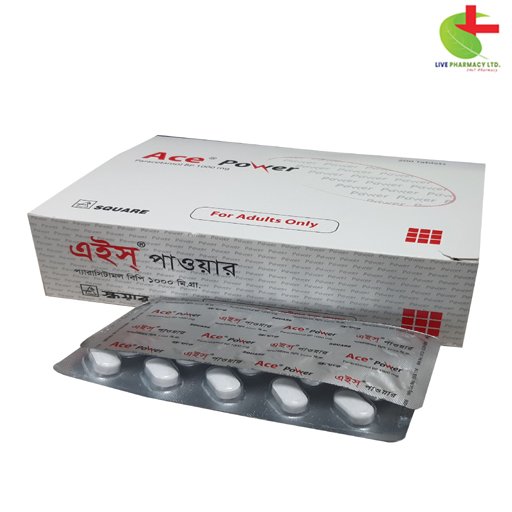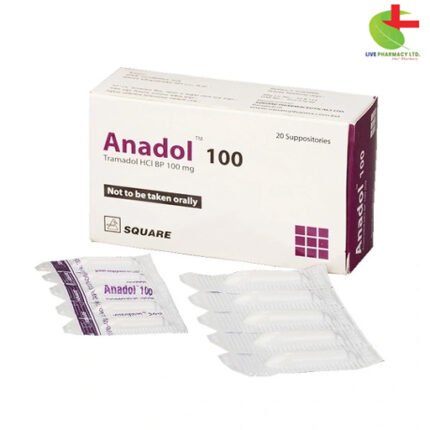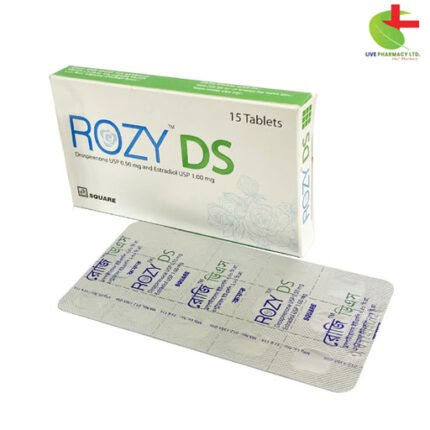Ace Power 1000
22.50৳ Strip
- Ace Power offers potent relief for fever, cold, headaches, and inflammatory pain.
- Its analgesic and antipyretic properties ensure fast and effective relief.
- Suitable for various discomforts including post-operative pain and joint stiffness.
- Trusted by individuals of all ages for safe and efficient pain management.
 Brand
Brand
|
Square Pharmaceuticals PLC |
|---|---|
 Generics
Generics
|
Paracetamol |
Indications
Ace Power serves as a remedy for a range of ailments including fever, common cold, influenza, headaches, toothaches, earaches, body aches, myalgia, neuralgia, dysmenorrhea, sprains, colic pain, back pain, post-operative pain, postpartum pain, inflammatory pain, and post-vaccination pain in children. Additionally, it provides relief for rheumatic and osteoarthritic pain and stiffness in joints.
Pharmacology
Containing paracetamol, Ace Power offers analgesic and antipyretic properties, along with mild anti-inflammatory activity. Paracetamol primarily acts within the central nervous system (CNS), raising the pain threshold by inhibiting various enzymes involved in prostaglandin synthesis.
Dosage & Administration
The dosage varies depending on age and form of the medication. Tablets, extended-release tablets, syrup/suspension, suppositories, and pediatric drops each have specific dosage instructions tailored to age groups. Special formulations such as those with Actizorb technology dissolve faster than standard tablets, offering rapid relief.
Interaction
Patients should be cautious if they’ve recently taken barbiturates, tricyclic antidepressants, or alcohol, as these substances may affect the metabolism of Ace Power. Alcohol, in particular, can enhance the hepatotoxicity of Ace Power overdoses.
Contraindications
Ace Power should not be used in individuals with known hypersensitivity to paracetamol.
Side Effects
While side effects are typically mild, Ace Power may occasionally lead to hematological reactions or allergic responses. Monitoring for adverse effects like pancreatitis or skin rashes is advised.
Pregnancy & Lactation
Research suggests that paracetamol, when used in recommended doses, poses no significant risks during pregnancy. Breastfeeding mothers can generally use Ace Power without concern, as minimal amounts are excreted in breast milk.
Precautions & Warnings
Patients with severe renal or hepatic impairment should use Ace Power cautiously. Overdose risk is heightened in individuals with non-cirrhotic alcoholic liver disease.
Overdose Effects
Liver damage is a concern in cases of Ace Power overdose. Immediate treatment, including activated charcoal and N-acetylcysteine, is crucial in managing overdoses.
Therapeutic Class
Ace Power falls under the category of non-opioid analgesics.
Storage Conditions
It’s recommended to store Ace Power in a dry place away from light and heat, and out of reach of children.
Chemical Structure
Ace Power’s molecular formula is C8H9NO2.
Common Questions about Ace Power 1000 mg Tablet
FAQs address the uses, side effects, storage instructions, and precautions related to Ace Power 1000 mg Tablet, offering comprehensive information for users.
Quick Tips
Users are advised to take Ace Power with food or milk to avoid stomach upset, adhere to prescribed dosages, and avoid consuming alcohol while taking the medication. Monitoring kidney and liver function may be necessary for long-term users.













Reviews
There are no reviews yet.